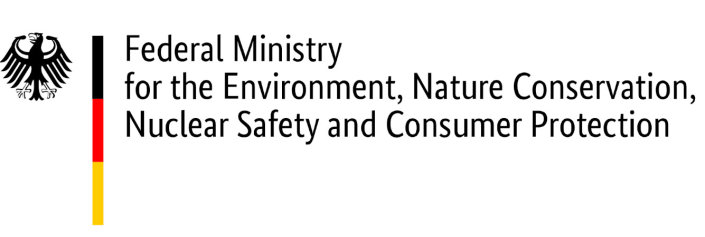Adaptation to the consequences of climate change as a Living Lab Kolpingstadt Kerpen (ARKE)
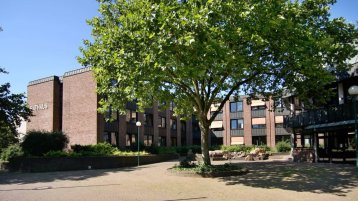
The objective of ARKE is to develop a strategy for adapting to the consequences of climate change for the Kolpingstadt Kerpen. This involves specifying threats from drought, floods, heatwaves, windthrow, or even hail through a comprehensive climate and vulnerability analysis and identifying local-specific measures (e.g., development of green-blue infrastructures) for the present and future.
Due to climate change, the frequency and intensity of extreme events such as heavy rainfall, floods, and drought periods continue to increase. It is becoming increasingly urgent to prepare cities and regions for the impacts.
The project "Adaptation to the Consequences of Climate Change as a Living Lab in the Kolpingstadt of Kerpen (ARKE)" develops a climate adaptation strategy that consolidates measures for the various areas of action in the Kolpingstadt of Kerpen. A special focus is on the expected climate impacts on agriculture, forestry, and in spatial, regional, and development planning.
At a Glance
| Category | Description |
|---|---|
| Research project | Adaptation to the consequences of climate change as a living laboratory Kolpingstadt Kerpen in the Rhenish mining area (ARKE). A joint project of the TH Köln – University of Applied Sciences and the Kolpingstadt Kerpen, North Rhine-Westphalia. |
| Management | Project Lead: Prof. Dr. Lars Ribbe Personal Profile |
| Faculty | Faculty of Spatial Development and Infrastructure Systems |
| Persons involved | Silvia Krautzik (Project Coordination) |
| Partners | Kolpingstadt Kerpen More |
| Sponsors |
- Project executing organisation: Zukunft - Umwelt - Gesellschaft (ZUG) gGmbH - Funded by the Federal Ministry for the Environment, Nature Conservation, Nuclear Safety and Consumer Protection (BMUV) |
| Duration | April 2023 until March 2026 |
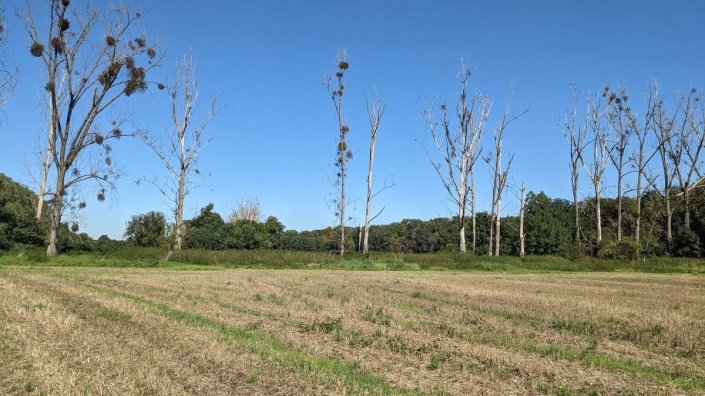 The consequences of climate change are evident at "Frenser Graben"
(Image: Stadt Kerpen)
The consequences of climate change are evident at "Frenser Graben"
(Image: Stadt Kerpen)
Climate extremes with high risk of damage
An initial analysis of the impact of climate effects in Kerpen shows a high to very high risk of drought stress for forest and agricultural areas, with significant effects on urban greenery. A striking example of this is the condition of the vegetation at Frenser Graben, where the effects of drought are clearly visible during the summer months. Here, one can see how fields, meadows, and trees suffer from the lack of water. Moreover, drought stress in plants can lead to crop failures and reductions in crop quality, which warrants further investigation. Therefore, an increase in heat-loving plant diseases and pests in the region is also expected in the future. Additionally, the heavy rainfall events in July 2021 have shown that not only are extreme heat and drought periods becoming more frequent, but a range of climate extremes with high damage potential can occur.
Local Measures
The aim of ARKE is to create a comprehensive and effective portfolio of adaptation measures for the Kolpingstadt Kerpen. The development of a locally specific catalog of measures is therefore an integral part of ARKE in order to prepare the city for the effects of climate change.
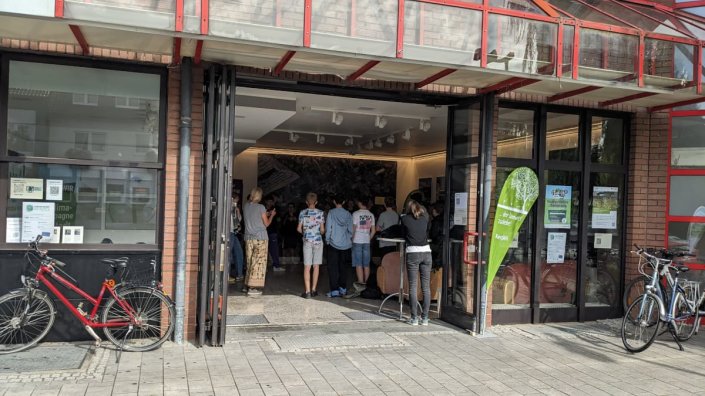 At the Future Days in Kerpen, citizens were able to find out about sustainability, climate and environmental protection and the ARKE project
(Image: Stadt Kerpen)
At the Future Days in Kerpen, citizens were able to find out about sustainability, climate and environmental protection and the ARKE project
(Image: Stadt Kerpen)
Collaborative project with local stakeholders
ARKE is carried out in cooperation with the TH Köln and the Kolpingstadt Kerpen and is based on the involvement of local stakeholders. This includes cooperation with the city administration and other regional stakeholders in order to incorporate a broad spectrum of experience and knowledge. The aim is to combine local knowledge with existing data on climate impacts and risks in order to launch an effective and cross-departmental adaptation strategy.
Blue-green infrastructures
In the final phase of the project, so-called blue-green infrastructures are also to be implemented as adaptation measures. Blue-green infrastructures are naturally grown or nature-oriented green and water areas, which, for example, can serve as water reservoirs and optimize the management of the water cycle with regard to climate extremes.
Workflow
The foundation for the development of a comprehensive climate change adaptation strategy is the detailed analysis of climatic changes and their effects on the Kolping City of Kerpen. Here, data from the German Weather Service (DWD) for the urban area are evaluated to determine trends in climate parameters such as temperature, precipitation, or wind for Kerpen. Additionally, climate projections based on the RCP scenarios are considered for future analysis.
Following the analysis of climatic conditions, a sectoral impact and risk analysis is carried out. This includes the formulation of relevant fields of action for Kerpen and lays the foundation for a targeted risk assessment. Building on this, a catalog of adaptation measures will be developed, evaluated and prioritized.
In the final year of the project, the focus is on the selection and implementation of initial pilot measures. A special emphasis is placed on verifying the applicability and effectiveness of the measures, with the goal of enabling their transferability to other municipalities.
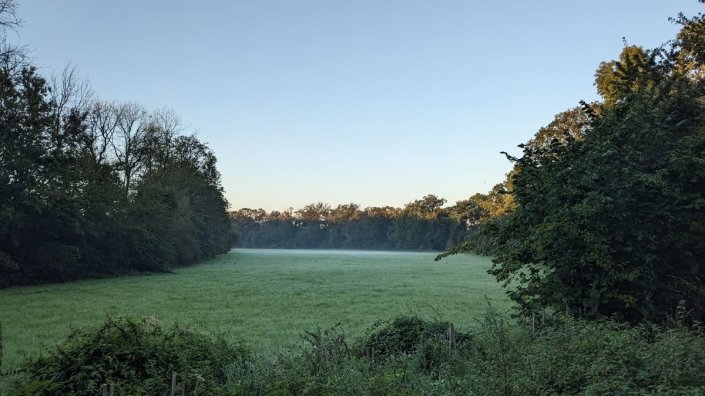 Parrig – Woodland between Horrem and Kerpen
(Image: Stadt Kerpen)
Parrig – Woodland between Horrem and Kerpen
(Image: Stadt Kerpen)
A special focus is placed on the expansion of green-blue infrastructures. These nature-oriented areas play a crucial role in protecting and improving the quality of life in urban and rural spaces. They offer solutions not only to counteract drought stress but also to effectively manage the impacts of heavy rainfall events in built-up areas, agriculture and forestry, as well as in water management.



